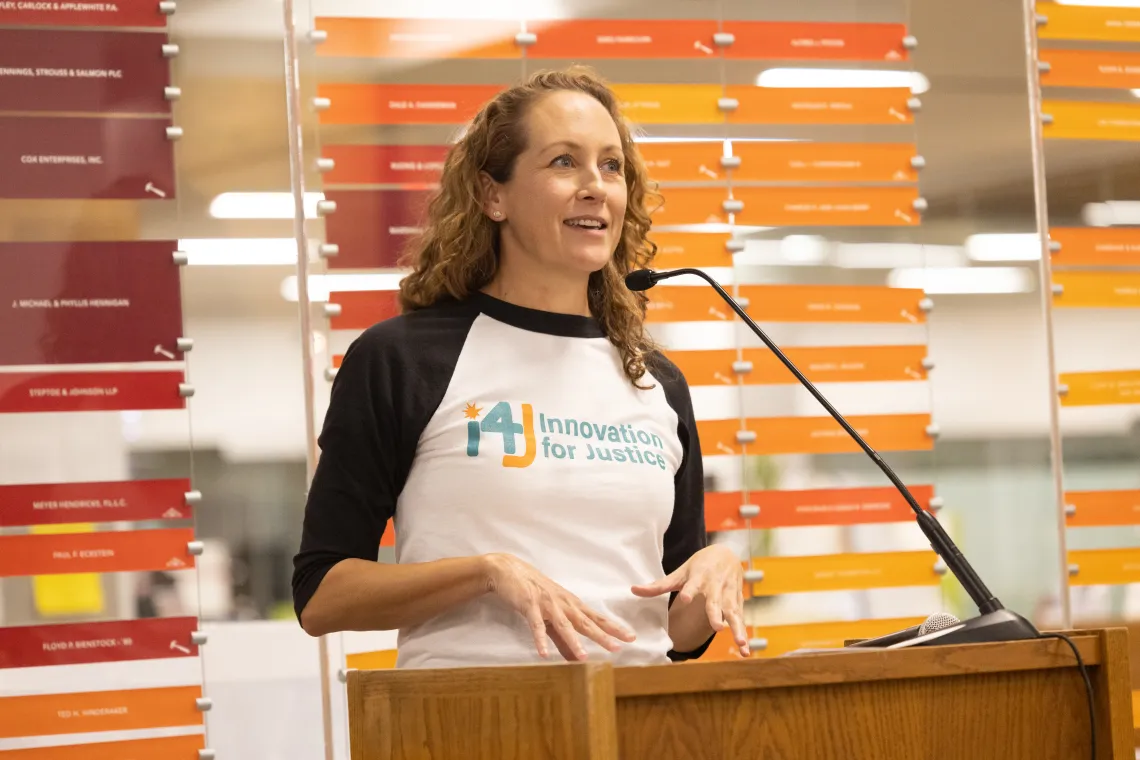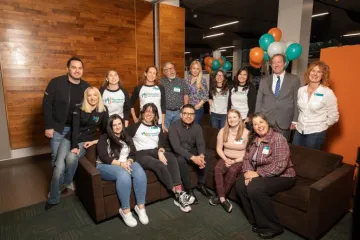Innovation for Justice Celebrates 5 Years of Unlocking Change, Announces Changemaker Award
The award was created through a partnership with Stephen Golden (’02), alumnus of the University of Arizona College of Law.

Innovation for Justice (i4J), a social justice-focused legal innovation lab housed in the University of Arizona James E. Rogers College of Law and the University of Utah's David Eccles School of Business, celebrated its 5th anniversary this week by announcing the establishment of the i4J Changemaker Award, an honor recognizing a law firm, non-profit or government organization that has made an original, creative, distinctive or sustained contribution to increasing access to legal services.
i4J is the nation’s first and only cross-discipline, cross-institution and cross-jurisdiction legal innovation lab. The program’s award-winning approach focuses on three main strategies: creating new legal-service models, improving user experience for justice sector technologies and building new platforms to support policy advocacy. Their work has been cited in numerous academic journals and featured in publications like The New York Times, Bloomberg Law, The Washington Post and CNN.
“At i4J, we believe in project-based learning where students co-create access to justice solutions by working with and within communities, and this award is a testament to that belief,” said Stacy Rupprecht Jane, director of i4J. “Our experience within the access to justice movement has provided us with the opportunity to collaborate with hundreds of creative and committed partners. We look forward to celebrating and supporting those partners and highlighting the work of others who are making a real difference in their communities through innovative solutions."

The civil legal system promises justice for all, but that promise is not being delivered. Barriers to entry, power imbalances, and flawed processes inhibit the civil legal system from working as it should.
Ninety-two percent of low-income community members in the U.S. receive inadequate or no legal help when confronted with serious civil legal issues such as domestic violence, eviction and debt collection. Yet many lawyers and organizations remain focused on the traditional, valuable but ultimately incomplete response of the professional commitment of lawyers to pro bono service and the funding of public civil lawyers.
Since its founding in 2018, i4J’s interdisciplinary community of students, faculty, partners and collaborators have worked to advance fair and equitable dispute resolution strategies through systems-level change at both service and policy levels. The program seeks to expose root causes while avoiding merely treating the symptoms. Current projects include the first pilot in the U.S. to train and license non-lawyers to provide limited-scope legal advice to domestic violence survivors in family law cases, and the first usability evaluation of an online dispute resolution platform in the U.S which will make it possible for parties in civil cases to proceed in legal matters online anytime, eliminating access and convenience issues. Last month, i4J also released the Medical Debt Policy Scorecard that ranks states based on their current medical debt policies. The online scorecard was developed as a resource for policymakers when addressing a mounting medical debt crisis.
The i4J Changemaker Award was made possible through a generous contribution from Stephen Golden (’02), alumnus of the University of Arizona College of Law. Nominations will be welcomed and solicited each fall with the winner announced in early November. Nominations will be judged by a committee made up of members of the i4J team as well as i4J co-creators from the public and private sector. Self-nominations will be accepted.
"The goal in creating this award was to recognize the work of lawyers, law firms and non-profits who are making an important difference in the civil legal system," said Golden. "This award will highlight the great work of I4J and celebrate innovative and transformative work in the legal field. We think it will inspire others to think differently about how we can close the justice gap.”
To learn more about Innovation for Justice.
